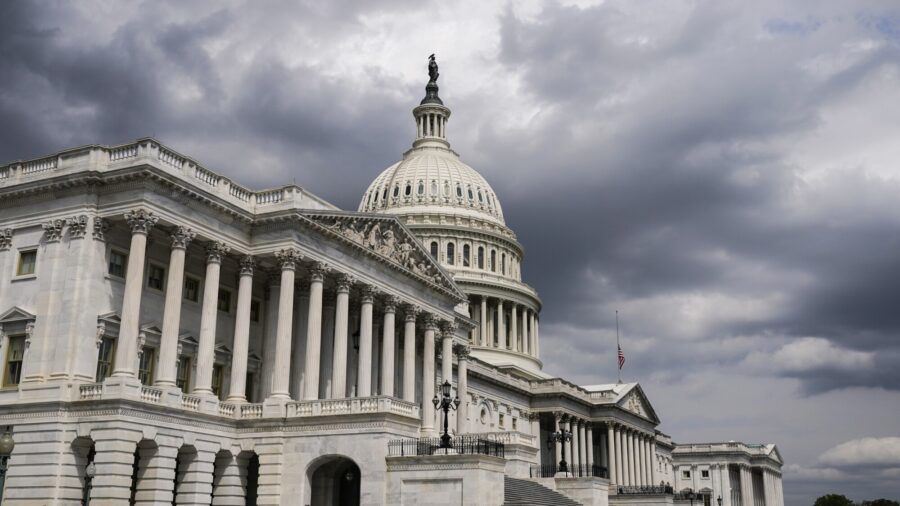An exasperated Sen. Marco Rubio (R-Fla.) tweeted his frustration late Thursday after the Senate on a 91-4 vote adopted a measure that cuts U.S. tariffs on hundreds of products imported from China.
“The ‘China bill’ now reduces tariffs on hundreds of products made in #China. Why would we cut tariffs on China in a bill to improve American’s ability to compete with China? And only @HawleyMO, @TomCottonAR @BernieSanders, and I voted against it. #Strangebedfellows,” Rubio said in his tweet.
Just a few minutes before that tweet, Rubio tweeted a segment of his floor speech from earlier in the day in which he passionately told Senate colleagues the national security safeguards in the bill to protect U.S. technology research are inadequate.
“What I want you to understand is this is not a minor security threat, this is the number one priority of Chinese intelligence, this is what all of their agencies and all of their government are geared towards doing,” Rubio said, referring to Chinese digital and human intelligence theft of American secrets.
Rubio’s ire was stirred by the amendment that ran to more than 280 pages, making major changes to Senate Majority Leader Chuck Schumer’s U.S. Innovation and Competition Act, formerly known as the Endless Frontier Act.
The amendment was introduced by Sen. Mike Crapo (R-Idaho) and co-sponsored by Republican senators Charles Grassley of Iowa, Pat Toomey of Pennsylvania, John Barrasso of Wyoming, Richard Burr of North Carolina, Steve Daines of Montana, John Cornyn of Texas, James Lankford of Oklahoma and Todd Young of Indiana.
An internal analysis of the amendment described it as having four major flaws, including:
- First, it would break with precedent by establishing the first Inspector General for an office in the Executive Office of the President.
- Second, it removes tariffs on Personal Protective Equipment (PPE), undercutting American producers who have made significant investments in capacity because of the pandemic.
- Third, the new enforcement tools given the United States Trade Representative (USTR) on digital trade do not meaningfully advance U.S. industry, and are supported by Google and other Big Tech companies as a means to evade foreign regulations and taxes.
- Finally, the amendment reauthorizes the Miscellaneous Tariff Bill (MTB), which unilaterally reduces tariffs on thousands of products made in China.
The amendment’s text included a lengthy list of chemical products required for research and production in numerous industrial and technology sectors. Tariffs and duties on each of them would be eliminated or reduced.
The list also included clothing and apparel products, electric equipment parts and products, numerous automotive parts, and pumps, including Turbomolecular.
The U.S. imports an estimated $500 billion in products from China annually. That total would likely increase as a result of lowered or eliminated U.S. tariffs.
Schumer’s renamed bill provides extensive reforms in the National Science Foundation (NSF) and provides a massive increase in funding, from its present $8.5 billion annual budget by creating within it a new Directorate for Technology and Innovation that would receive $100 billion over the next five years.
“The goals of the directorate shall be, among other things, the strengthening of U.S. leadership in critical technologies through basic research in key technology focus areas, such as artificial intelligence, high-performance computing, and advanced manufacturing, and the commercialization of those technologies to businesses in the United States,” according to the Congressional Research Service.
“The bill gives the NSF the authority to provide for the widest practicable and appropriate dissemination of information within the United States concerning the NSF’s activities and the results of those activities.”
In addition, the Schumer proposal would dramatically increase NSF’s work in the areas of critical technologies in the national security sector of advanced technology research.
The proposal also directs the White House Office of Science and Technology Policy to develop on an annual basis “a strategy for the federal government to improve national competitiveness in science, research, and innovation to support the national security strategy.”
In addition, the bill directs the Department of Commerce to “(1) establish a supply chain resiliency and crisis response program to address supply chain gaps and vulnerabilities in critical industries, (2) designate regional technology hubs to facilitate activities that support regional economic development that diffuses innovation around the United States, and (3) award grants to facilitate development and implementation of comprehensive regional technology strategies.”
The U.S. Innovation and Competition Act will likely be voted on by the Senate next week. Assuming it passes, it then will go to the House for consideration.
Congressional correspondent Mark Tapscott may be contacted at [email protected]
From The Epoch Times

